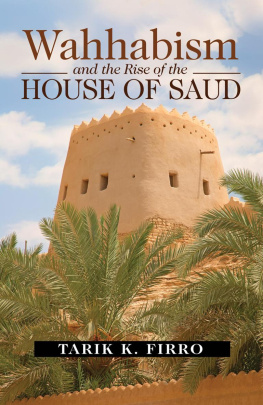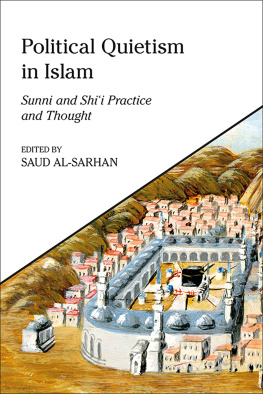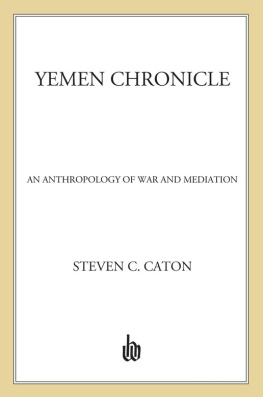Catherine Shakdam - A Tale Of Grand Resistance: Yemen, the Wahhabi, and the House of Saud
Here you can read online Catherine Shakdam - A Tale Of Grand Resistance: Yemen, the Wahhabi, and the House of Saud full text of the book (entire story) in english for free. Download pdf and epub, get meaning, cover and reviews about this ebook. year: 2016, publisher: Shafaqna Institute for Middle Eastern Studies, genre: Politics. Description of the work, (preface) as well as reviews are available. Best literature library LitArk.com created for fans of good reading and offers a wide selection of genres:
Romance novel
Science fiction
Adventure
Detective
Science
History
Home and family
Prose
Art
Politics
Computer
Non-fiction
Religion
Business
Children
Humor
Choose a favorite category and find really read worthwhile books. Enjoy immersion in the world of imagination, feel the emotions of the characters or learn something new for yourself, make an fascinating discovery.
- Book:A Tale Of Grand Resistance: Yemen, the Wahhabi, and the House of Saud
- Author:
- Publisher:Shafaqna Institute for Middle Eastern Studies
- Genre:
- Year:2016
- Rating:4 / 5
- Favourites:Add to favourites
- Your mark:
- 80
- 1
- 2
- 3
- 4
- 5
A Tale Of Grand Resistance: Yemen, the Wahhabi, and the House of Saud: summary, description and annotation
We offer to read an annotation, description, summary or preface (depends on what the author of the book "A Tale Of Grand Resistance: Yemen, the Wahhabi, and the House of Saud" wrote himself). If you haven't found the necessary information about the book — write in the comments, we will try to find it.
A Tale Of Grand Resistance: Yemen, the Wahhabi, and the House of Saud — read online for free the complete book (whole text) full work
Below is the text of the book, divided by pages. System saving the place of the last page read, allows you to conveniently read the book "A Tale Of Grand Resistance: Yemen, the Wahhabi, and the House of Saud" online for free, without having to search again every time where you left off. Put a bookmark, and you can go to the page where you finished reading at any time.
Font size:
Interval:
Bookmark:
MANIPULATION52
Saudi Arabia had been at war with Yemen longbefore its grand coalition of allies decided to join it and partake initsvengeful military campaignagainst this, the poorest nation in Southern Arabia on25 March 2015. Yemens misfortune began at thevery moment its people rose as a movement against institutionalised servitude, many decades ago in1962.
Little could the Yemenis have suspected then, that their claim for self-governance against the Imamate, would prompt the Kingdom to seek theirenslavement actively. As Pan-Arabism rose like acolossus against the monarchies of the GreaterMiddle East - a new political dawn on the back ofthe broken bones of imperialism, Saudi Arabiarecognised in Yemen both the key and thecornerstone to its ambitious hegemonic future.Proportionally, Yemen carried within itself the seedsof the Kingdoms destruction a ticking geo-politicalbomb of sorts.
It is important to remember that if Yemen standstoday, a broken shell of a country, a petri dish for allthings radical, and a poster child for the failed state, it is because Riyadh made it so. Yemensmisfortune, its crippling poverty and diseasedinstitutions are the product of decades of latentcolonialism.
Hussain Mousavi, a political analyst, noted in an interview with the Shafaqna Institute for MiddleEastern Studies1:
The institutional history of post-Imamate Yemen hasbeen misconstrued. Yemen, while defining itself as arepublic has its political power rooted in tribalismand nepotism, an attribute it shares with Arabmonarchies. To see Yemen through a republican lens is missing Yemens realpolitik.
I would argue that Yemen has very muchfunctioned as tribal monarchy, where the tribes have held real power, and not the people a setup which is eerily reminiscent to that of Saudi Arabia,Kuwait, Bahrain, Qatar, and even Jordan. Yemenalways was a pretenceRepublic, designed toprevent any REAL populist political ambitions.
If the Kingdom were ever to reign supreme overArabia, unruly Yemen this one geostrategic jewel would have to be made subservient to the crown ofal-Saud.
The geopolitical importance of Yemen cannot beignored. The country controls entry into the Red Sea(towards the Suez Canal) and the Bab-el-Mandebstraits, which although less important than the Straitsof Hormuz, is the point of passage for oil and gas onits way to Europe, wrote Alain Gresh in April 2015 ina report published for The New Arab.
1 The Shafaqna Institute for Middle Eastern Studies is an affiliate ofShafaqna News AgencyHe added, Stability in Yemen is also a vital strategicgoal for Saudi Arabia. The late King Abdul-Azizfamously told his sons: "What is good for you andwhat is bad for you comes from Yemen."
In this bitter battle for hegemonic control, Yemen has been a lamb brought to the slaughter, aplayground for a newly evolved form of asymmetricimperialism one which has relied on proxies toeffectuate its will, while muddying thepoliticalwaters3 to hide its hand.Control, through theestablishment of an energy monopoly.
Saudi Arabias agenda in Yemen is simple in that it isegocentric! Saudi Arabia needs Yemen if it is ever toachieve control in the region; socio-political control,control over natural resources, geo-military control,economic control, and of course religioussuperiority. Riyadhs success remains dependent onits ability to bring Yemen to kneel. Understand this,and everything else will fall into place. The only agendas the Kingdom EVER had in Yemen werecolonial and imperial. Yemen was never to becomea buoyant democracy.
2 https://www.alaraby.co.uk/english/comment/2015/4/5/a-tangle-ofconflicts-and-geopolitical-ambitions-in-yemen
3 https://theintercept.com/2015/10/05/saudi-arabia-continues-hirepolitically-connected-american-lobbyists-public-relation-firms/
While Yemen did, in fact, manage to reinvent itselfas a republic in a sea of absolute monarchies; itsseverely infiltrated institutions, its political andeconomic systems setup for feudality; resulted in itsRepublican claims being little more than aninstitutional mirage cloaking the reality of tribalism.
Yemens present lies in the understanding of its past,and those dynamics which were set in motion longago. With a symmetry, which does not lack a certainpoetry, it appears that Yemens true liberation fromthe shackles of feudalism, as expressed by SaudiArabian imperialism, would come by way of theHouthis a tribe from northern Yemen, historicallylinked to the Imamate.
Hailing from northern Saada in highlands of Yemen, the Houthis are first and foremost a tribal factionwherein loyalty remains forever attached to the alHouthi clan, the custodian of a religious heritage fewhave been able to comprehend, let aloneencompass.
Sheikh Abdel-Malik al-Houthi4 stands not as a meretribal leader over his tribesmen; rather he is northern Yemens religious leader. He is a combination ofboth Yemens past and its future a bridgetraversing traditions and a desire to raise state institutions rooted in popular legitimacy.
4 https://en.wikipedia.org/wiki/Abdul-Malik_Badreddin_al-HouthiAnd though many have seen Sheikh al-Houthi as an ambitious leader in search of a fief, it needs to beunderstood that his ambitionstranscendthe political. His house stands above the political fray,the custodian of an Islamic religious tradition whichstretches back to the birth of Islam.
While I will circle back to this; it is important to makeclear the importance of the religious in Yemenshistory. Here, I am not making reference toWahhabism or as the mainstream media like to callit Islamic Radicalism, rather much more besides.
If a war is being waged against Yemen and itspeople, there is another more insidious campaignwhich has been waged against its religious identity:Zaidism.
Because of Zaidism - which like all other expressionsof Shia Islam stands unreservedly against all form ofabsolutism - Wahhabi Saudi Arabia has worked,ambitioned and schemed to lay it to waste. Behindthe glitz and political glam the Kingdom has sodiligently projected onto the world, hides an agenda which should send shivers down your spine.Should Yemen fall, Riyadh would rise a titan over theworld oil route, wielding energy security in the faceof the mightiest of military powers.
Bearing in mind that it was Saudi Arabia whichinspired the rise of terror, through the promotion of Takfirism the foundation of Wahhabism, I wouldargue that world powers need to stand with theYemens Resistance, and not the Kingdom. If not outof respect for its popular will, at least out of a senseof self-preservation.
It is now 1918, and the formerly grand and powerfulOttoman Empire is breathing its last. As inner tensionsand wars have eroded the empire, the Ottomanswithdraw from Yemen a territory which had provenunbending and unyielding to the will of the Sultan.Although an Ottoman colony on paper, Yemen wasnever exactly a loyal vassal; a reality the Ottomanshad learnt to contend with for the sake ofgeopolitical supremacy.
Since conquering the Yemen was not possible, the Ottomans entered into an alliance with the Imamsof Yemen, thus ensuring that Arabia would becontained away from the influence of anothersuper-power: Persia (modern day Iran).
As WW1 ended, Yemen witnessed the departure ofthe Ottomans. Free from foreign diktat, Imam Yahyatook control of the country (northern Yemen). He would remain as Imam of Yemen (king) until hisdeath in 1948. During his rule, Yemen joined the ArabLeague (1945) and the United Nations (1947). Imam Yahyas rule was fraught with political opposition his reign would end in blood as he was assassinatedin a failed coup attempt against his Imamate. It washis son, Ahmad, who took over, reigning until hisdeath in 1962.
Font size:
Interval:
Bookmark:
Similar books «A Tale Of Grand Resistance: Yemen, the Wahhabi, and the House of Saud»
Look at similar books to A Tale Of Grand Resistance: Yemen, the Wahhabi, and the House of Saud. We have selected literature similar in name and meaning in the hope of providing readers with more options to find new, interesting, not yet read works.
Discussion, reviews of the book A Tale Of Grand Resistance: Yemen, the Wahhabi, and the House of Saud and just readers' own opinions. Leave your comments, write what you think about the work, its meaning or the main characters. Specify what exactly you liked and what you didn't like, and why you think so.












